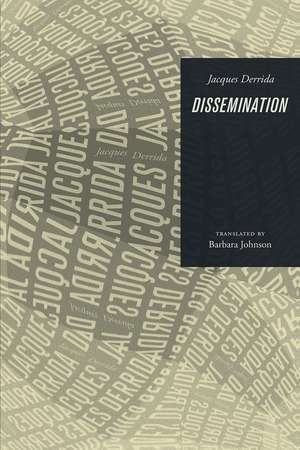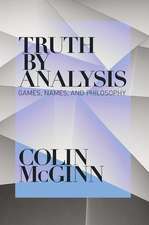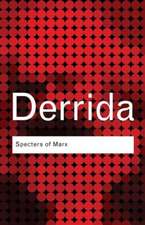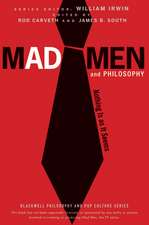Dissemination
Autor Jacques Derrida Traducere de Barbara Johnsonen Limba Engleză Paperback – 31 aug 2017
"The English version of Dissemination [is] an able translation by Barbara Johnson . . . . Derrida's central contention is that language is haunted by dispersal, absence, loss, the risk of unmeaning, a risk which is starkly embodied in all writing. The distinction between philosophy and literature therefore becomes of secondary importance. Philosophy vainly attempts to control the irrecoverable dissemination of its own meaning, it strives—against the grain of language—to offer a sober revelation of truth. Literature—on the other hand—flaunts its own meretriciousness, abandons itself to the Dionysiac play of language. In Dissemination—more than any previous work—Derrida joins in the revelry, weaving a complex pattern of puns, verbal echoes and allusions, intended to 'deconstruct' both the pretension of criticism to tell the truth about literature, and the pretension of philosophy to the literature of truth."—Peter Dews, New Statesman
| Toate formatele și edițiile | Preț | Express |
|---|---|---|
| Paperback (3) | 122.23 lei 6-8 săpt. | +35.08 lei 7-13 zile |
| Bloomsbury Publishing – 24 feb 2016 | 163.86 lei 3-5 săpt. | +35.08 lei 7-13 zile |
| Bloomsbury Publishing – 13 oct 2004 | 122.23 lei 6-8 săpt. | |
| University of Chicago Press – 31 aug 2017 | 270.52 lei 6-8 săpt. |
Preț: 270.52 lei
Nou
Puncte Express: 406
Preț estimativ în valută:
51.76€ • 56.46$ • 43.65£
51.76€ • 56.46$ • 43.65£
Carte tipărită la comandă
Livrare economică 24 aprilie-08 mai
Preluare comenzi: 021 569.72.76
Specificații
ISBN-13: 9780226503479
ISBN-10: 022650347X
Pagini: 400
Dimensiuni: 140 x 216 x 28 mm
Greutate: 0.46 kg
Editura: University of Chicago Press
Colecția University of Chicago Press
ISBN-10: 022650347X
Pagini: 400
Dimensiuni: 140 x 216 x 28 mm
Greutate: 0.46 kg
Editura: University of Chicago Press
Colecția University of Chicago Press
Notă biografică
Barbara Johnson is a professor of English and Comparative Literature at Harvard University.
Cuprins
Translator's Introduction
Outwork, prefacing
Plato's Pharmacy
I.
1. Pharmacia
2. The Father of Logos
3. The Filial Inscription: Theuth, Hermes, Thoth, Nabu, Nebo
4. The Pharmakon
5. The Pharmakeus
II.
6. The Pharmakos
7. The Ingredients: Phantasms, Festivals, and Paints
8. The Heritage of the Pharmakon: Family Scene
9. Play: From the Pharmakon to the Letter and from Blindness to the Supplement
The Double Session
I
II
Dissemination
I.
1. The Trigger
2. The Apparatus or Frame
3. The Scission
4. The Double Bottom of the Plupresent
5. wriTing, encAsIng, screeNing
6. The Attending Discourse
II.
7. The Time before First
8. The Column
9. The Crossroads of the "Est"
10. Grafts, a Return to Overcasting
XI. The Supernumerary
Outwork, prefacing
Plato's Pharmacy
I.
1. Pharmacia
2. The Father of Logos
3. The Filial Inscription: Theuth, Hermes, Thoth, Nabu, Nebo
4. The Pharmakon
5. The Pharmakeus
II.
6. The Pharmakos
7. The Ingredients: Phantasms, Festivals, and Paints
8. The Heritage of the Pharmakon: Family Scene
9. Play: From the Pharmakon to the Letter and from Blindness to the Supplement
The Double Session
I
II
Dissemination
I.
1. The Trigger
2. The Apparatus or Frame
3. The Scission
4. The Double Bottom of the Plupresent
5. wriTing, encAsIng, screeNing
6. The Attending Discourse
II.
7. The Time before First
8. The Column
9. The Crossroads of the "Est"
10. Grafts, a Return to Overcasting
XI. The Supernumerary
Caracteristici
Includes a detailed introduction and additional notes on the text by Barbara Johnson
Recenzii
The English version of Dissemination [is] an able translation by Barbara Johnson . . . . Derrida's central contention is that language is haunted by dispersal, absence, loss, the risk of unmeaning, a risk which is starkly embodied in all writing. The distinction between philosophy and literature therefore becomes of secondary importance. Philosophy vainly attempts to control the irrecoverable dissemination of its own meaning, it strives-against the grain of language-to offer a sober revelation of truth. Literature-on the other hand-flaunts its own meretriciousness, abandons itself to the Dionysiac play of language. In Dissemination-more than any previous work-Derrida joins in the revelry, weaving a complex pattern of puns, verbal echoes and allusions, intended to 'deconstruct' both the pretension of criticism to tell the truth about literature, and the pretension of philosophy to the literature of truth.















